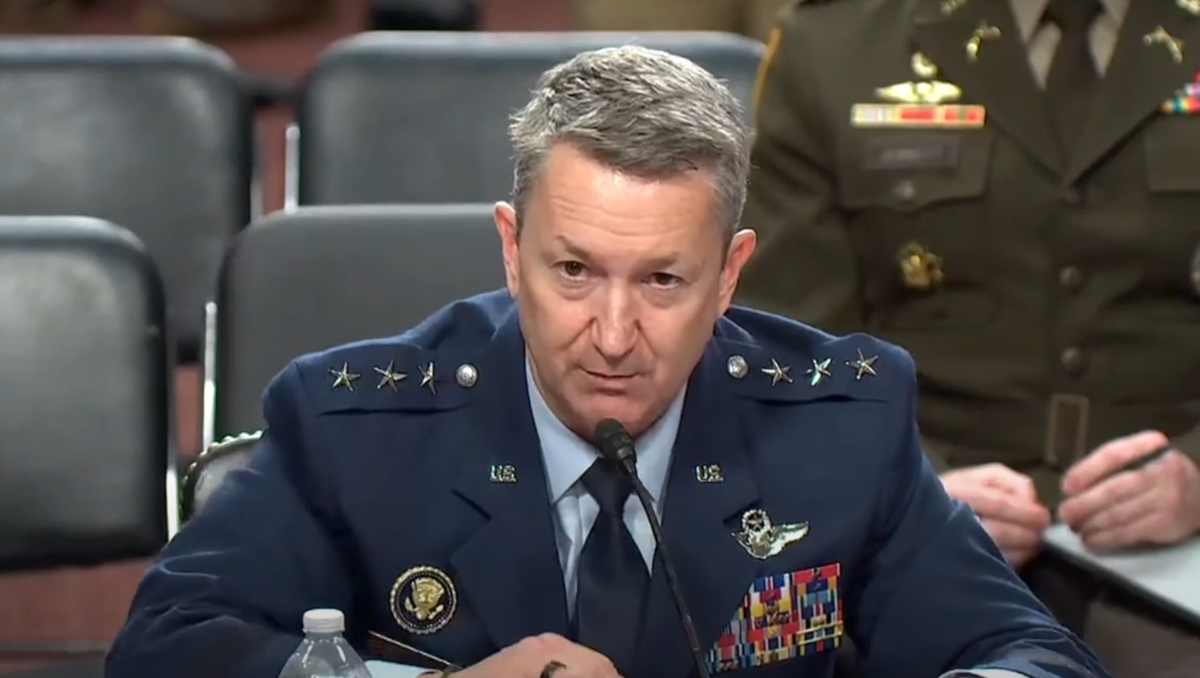
Despite the fact that so many of them make it look easy, the daily lives of senior U.S. military leaders can be incredibly demanding. Laura Weimer examined how senior leaders manage their well-being (or, at times, struggle to do so) amidst these demanding careers, and she’s in the studio with host JP Clark to share her discoveries. Drawing from her research, Weimer highlighted the unique pressures of senior roles, including frequent relocations, intense scrutiny, and the weight of consequential decisions. She also discussed the inevitable challenges of mid-life, such as caring for aging parents and navigating evolving family dynamics, which compound work-related stress. Weimer’s key takeaway? Developing a strong sense of identity, meaning, and purpose is essential for fostering resilience and sustaining leadership effectiveness.
I don’t know if necessarily it’s the Army’s job to help us figure out our identity. I do think it would be valuable for the Army to acknowledge the value of those conversations and maybe even prompt those conversations.
Podcast: Download
Links to resources referenced by Laura in the episode:
Joe Byerly, “Learning to Live a Halfway Interesting Life,” From the Green Notebook (March 19, 2025) https://fromthegreennotebook.com/2025/03/19/learning-to-live-a-halfway-interesting-life/
Briana Barker Caza, Lakshmi Ramarajan, Erin Reid, and Stephanie Creary. “How to Make Room in Your Work Life for the Rest of Your Self.” Harvard Business Review (May 30, 2018), https://hbr.org/2018/05/how-to-make-room-in-your-work-life-for-the-rest-of-your-self
Cal Newport, “The Most Important Piece of Career Advice You Probably Never Heard,” Cal Newport, May 21, 2008, https://calnewport.com/the-most-important-piece-of-career-advice-you-probably-never-heard/
Nick Craig and Scott A. Snook. 2014. “From Purpose to Impact.” Harvard Business Review, May. https://hbr.org/2014/05/from-purpose-to-impact.
Arthur C. Brooks, From Strength to Strength: Finding Success, Happiness, and Deep Purpose in the Second Half of Life (Penguin, 2022).
Simon Sinek, “The Cure for Loneliness with U.S. Surgeon General Vivek Murthy,” A Bit of Optimism Podcast, 7 January 2025. https://open.spotify.com/episode/6wnHgVpkuX0i4CdCEHSFkg?si=c58cf2607d274eb7
This is restricted access (academic):
Herminia Ibarra, “Provisional Selves: Experimenting with Image and Identity in Professional Adaptation.” Administrative Science Quarterly 44 (4) (1999): 764–91. https://doi.org/10.2307/2667055.
Laura Weimer is an Active Duty Army lieutenant colonel (Military Police) and a graduate of the AY25 Resident course at the U.S. Army War College. She most recently commanded the Headquarters Battalion of the 1st Armored Division at Fort Bliss, TX, and will be returning to Texas in June to serve in U.S. Army Futures Command (soon to be Transformation and Training Command). She taught Military Leadership and Intro to Sociology at West Point from 2013-2016 and holds a Ph.D. In Management from Harvard University, an M.A. in Sociology from Duke University, and a B.S. In Chemistry/Life Sciences from West Point. Her research and writing is focused on leader identity, development, and personal well-being.
JP Clark is an associate professor of military strategy teaching in the Basic Strategic Art Program. He served in the army for twenty-six years as an armor officer and strategist. He holds a Ph.D. and M.A. in history from Duke University, an M.S.S. from the Army War College, and a B.S. in Russian and German from West Point. He is the author of Preparing for War: The Emergence of the Modern U.S. Army, 1815-1917 (Harvard, 2017). He is currently working on a history of U.S. military strategy in the Pacific from 1898 to 1941 that is under contract with the University Press of Kansas. He is the 3rd Editor-in-Chief of War Room.
The views expressed in this presentation are those of the speakers and do not necessarily reflect those of the U.S. Army War College, U.S. Army, or Department of Defense.
Photo Description: Then Lieutenant General (Ret.) Dan Caine, USAF, when he appeared before the 1 April, 2025 Senate Confirmation Committee. Caine was nominated and later confirmed as the 22nd Chairman of the Joint Chiefs of Staff. The Chairman is the highest-ranking and most senior military officer in the United States Armed Forces and the principal military advisor to the President, the National Security Council, the Homeland Security Council, and the Secretary of Defense.
Photo Credit: Screen capture from CSPAN video of 1 April, 2025 Senate Confirmation Hearing.





From the written introduction to our podcast above:
“Developing a strong sense of identity, meaning, and purpose is essential for fostering resilience and sustaining leadership effectiveness.”
“I don’t know if necessarily it’s the Army’s job to help us figure out our identity. I do think it would be valuable for the Army to acknowledge the value of those conversations and maybe even prompt those conversations.”
Would I be correct in suggesting that, in the recent past, and for a rather long period of time, a soldier’s “identity” might have been understood as being in line with/as being consistent with the — generally understood at that time — American identity; an American identity which is described by (now retired) LTG Charles Cleveland and (also now retired) GEN Joseph Votel below:
“In the same way that the conventionally focused American way of war is defined by America’s technical and industrial capacity and technological edge, the American way of irregular war is tied to our notions of religious pluralism, democracy, and, above all, human rights. And although the American way of war protects us against near-peer powers and guarantees the lanes of global commerce, the American way of irregular war protects our way of life by both promoting our worldview and giving people the tools to realize the same opportunities that we have had. … ” (See last paragraph of Page 5 of the Introduction chapter to Rand paper by LTG [ret.] Charles Cleveland entitled: “The American Way of Irregular War: An Analytical Memoir.”)
“The Achilles’ heel of our authoritarian adversaries is their inherent fear of their own people; the United States must be ready to capitalize on this fear. … An American way of irregular war will reflect who we are as a people, our diversity, our moral code, and our undying belief in freedom.” (See the “Conclusion” of the Rand paper “The American Way of Irregular War: An Analytical Memoir” by Charles T. Cleveland and Daniel Egel.)
Advocates of UW first recognize that, among a population of self-determination seekers, human interest in liberty trumps loyalty to a self-serving dictatorship, that those who aspire to freedom can succeed in deposing corrupt or authoritarian rules, and that unfortunate population groups can and often do seek alternatives to a life of fear, oppression, and injustice.” Second, advocates believe that there is a valid role for the U.S. Government in encouraging and empowering these freedom seekers when doing so helps to secure U.S. national security interests. (See the National Defense University Press paper “Unconventional Warfare in the Gray Zone” by Joseph L. Votel, Charles T. Cleveland, Charles T. Connett, and Will Irwin)
If this indeed is the case (until recently, and indeed for a rather long period of time, a soldier’s “identity” was generally in line with — and generally consistent with — the well-understood identity of the United States, described in the quoted items provided above); if this indeed is the case, then did not THIS type of such association with and identification with the above-described American identity — did not THIS provide soldiers (etc., etc. etc.) — on active duty or thereafter — with “a strong sense of identity, meaning, and purpose essential for fostering resilience and for sustaining leadership effectiveness?”
Questions — Based on the matters that I present above:
If the American identity is no longer so much defined by and/or associated with those attributes noted by LTG (ret.) Cleveland and GEN (ret.) Votel above — to wit: “religious pluralism,” “democracy,” “human rights,” “giving people the tools to realize the same opportunities that we have had;” “our diversity,” “our moral code,” “our undying belief in freedom;” “helping unfortunate population groups seek alternatives to lives of fear, oppression, and injustice” — then, in these such circumstances,
a. What are the new/different attributes — that will now make up the new/different American identity? And:
b. Will soldiers, statespersons, etc., be able to use these such attributes, in the same way that soldiers, statespersons, etc., have been able to use the attributes noted by LTG (ret.) and GEN (ret.) Votel above? (Think: to provide “a “strong sense of identity, meaning, and purpose, which is essential to fostering resilience, and for sustaining leadership effectiveness” both during and after active duty.)
This was a great message for military leaders. Well done.